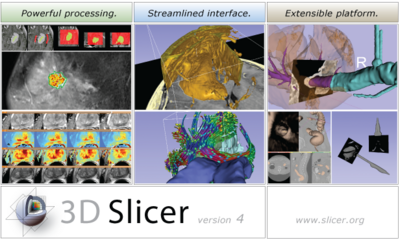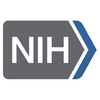Difference between revisions of "Main Page"
m (Fix MediaWiki table formatting issue discovered while converting to GitHub Flavored Markdown using pandoc (via https://github.com/outofcontrol/mediawiki-to-gfm)) Tag: 2017 source edit |
|||
| (138 intermediate revisions by 15 users not shown) | |||
| Line 1: | Line 1: | ||
| − | + | __NOTOC__ | |
| − | |||
| − | [[Image: | + | [[Image:NIHlogo.png|100px]][[Image:NIHHHS-logo.png|60px]] |
| − | + | These wiki pages are used to curate meetings and events of interest to developers and users of open source software for medical image computing. | |
| − | + | NA-MIC was founded as a multi-institutional, interdisciplinary team of computer scientists, software engineers, and medical investigators to develop computational tools for the analysis and visualization of medical image data. It was funded from 2004-2015 using a grant, U54 EB005149, from the NIBIB NIH HHS. NA-MIC created infrastructure and environment for the development of computational algorithms and open-source technologies, and created training and dissemination mechanisms for these tools to be distributed to the medical research community. | |
| − | + | '''While NA-MIC itself is no longer a funded research effort, many research projects driven by NA-MIC technologies continue.''' | |
| − | + | {| | |
| + | |[[Image:Slicer4Announcement-HiRes.png|400px|align:"top"]] | ||
| + | |- | ||
| + | | | ||
| + | Please visit the [[Events]] page to learn about meetings that to take place to continue biomedical research seeded by NA-MIC. | ||
| − | + | |- | |
| − | + | |Slicer 4.10 released in November 2018. See the [https://www.slicer.org/wiki/Documentation/4.10/Announcements Announcement] for more information. | |
| − | + | |} | |
| − | |||
| − | |||
| − | |||
| − | [ | ||
| − | |||
| − | |||
| − | |||
| − | |||
| − | |||
| − | |||
| − | |||
| − | |||
| − | |||
| − | |||
| − | |||
| − | |||
| − | |||
| − | |||
| − | |||
| − | |||
| − | |||
| − | |||
| − | |||
Latest revision as of 04:55, 11 April 2023
These wiki pages are used to curate meetings and events of interest to developers and users of open source software for medical image computing.
NA-MIC was founded as a multi-institutional, interdisciplinary team of computer scientists, software engineers, and medical investigators to develop computational tools for the analysis and visualization of medical image data. It was funded from 2004-2015 using a grant, U54 EB005149, from the NIBIB NIH HHS. NA-MIC created infrastructure and environment for the development of computational algorithms and open-source technologies, and created training and dissemination mechanisms for these tools to be distributed to the medical research community.
While NA-MIC itself is no longer a funded research effort, many research projects driven by NA-MIC technologies continue.

|
|
Please visit the Events page to learn about meetings that to take place to continue biomedical research seeded by NA-MIC. |
| Slicer 4.10 released in November 2018. See the Announcement for more information. |

